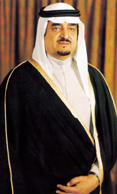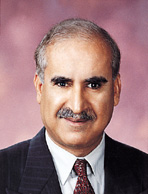Saudi Arabia Hopes to Further Ties with Korea
- Ambassador of Saudi Arabia to Korea delivers a message celebrating the National Day
 The following is a message from Saleh bin Mansour Al-Rajhy, ambassador of Saudi Arabia, on the occasion of the National Day of The Kingdom of Saudi Arabia that fell on Sept. 23, 2004 - Ed.
The following is a message from Saleh bin Mansour Al-Rajhy, ambassador of Saudi Arabia, on the occasion of the National Day of The Kingdom of Saudi Arabia that fell on Sept. 23, 2004 - Ed.
Today, as the Kingdom celebrates its 72nd National Day, Saudi citizens everywhere reminisce that historic day when the late King Abdul Aziz Al-Saud consolidated most of the Arabian Peninsula and unified the nation under the banner of Islam. The succeeding years have witnessed the emergence of a unified nation in political rule and religious principles which constantly serve as the guiding inspiration of our people to face the challenges of the future.
Now under the leadership and guidance of the Custodian of the Two Holy Mosques King Fahd Bin Abdul Aziz and His Royal Highness Crown Prince Abdullah Bin Abdul Aziz, Deputy Prime Minister and Commander of the National Guard, and His Royal Highness Prince Sultan Bin Abdul Aziz, Second Deputy Prime Minister, Minister of Defence & Aviation and Inspector- General, Saudi Arabia has achieved a remarkable progress in all sectors within a very short period of time.
King Fahd Bin Abdul Aziz and His Royal Highness Crown Prince Abdullah Bin Abdul Aziz, Deputy Prime Minister and Commander of the National Guard, and His Royal Highness Prince Sultan Bin Abdul Aziz, Second Deputy Prime Minister, Minister of Defence & Aviation and Inspector- General, Saudi Arabia has achieved a remarkable progress in all sectors within a very short period of time.
The discovery of oil in commercial quantities in 1938 and its steady export soon after World War II provided the revenues needed to realize the Kingdom's plans for national development. The following two decades witnessed the building of roads, airports, seaports, schools, hospitals and other facilities and services.
Saudi national development moved into higher gear in 1970. Having already met the basic needs of the society, the government embarked on an ambitious endeavor : to build a modern economy capable of producing a wide range of consumer and industrial goods that so far had to be imported. The key to achieving this lofty goal was careful planning and meticulous implementation. Although development was ongoing in the 1950's and 1960's, the Kingdom introduced a series of 5-year development plans in 1970 that brought cohesion and a long term outlook to economic growth and expansion.
The first three development plans (1970-1984) focused on establishing a modern infrastructure capable of servicing a thriving economy. Over 100,000 miles of modern roads and highways, three international airports and 22 regional ones were built, twenty one modern seaports were established on the Red Sea and the Arabian Gulf. To date, the government has built eight major universities, more than 25,000 schools and a large number of colleges and training centers and institutions to develop the manpower needed by the growing economy.
The 4th, 5th, 6th development plans (1985-1999) focused on further strengthening the rapidly growing private sector and increasing the efficiency of the industrial sector. The current Seventh development plan 2000-2004 focuses on speeding up the process of socio-economic development in the light of developments taking place on the local, regional and international levels through the activation of private investments (national and foreign) and taking the measures required to boost the investment climate. The plan also focuses on the automation of governmental transactions and the expansion of computerization to improve government performance and streamline procedures to enable the government agencies to cope with the international communication and information revolution. Saudi Arabia's economic transformation has been all encompassing, reaching into agriculture, commerce, banking and other non-industrial fields. Agriculture has boomed transforming the Kingdom from a country that had to import almost all of its food to one that is now self-sufficient in the production of many cereals, fruits, vegetables, and processed foods. Furthermore, it is now an exporter of many agricultural, poultry and dairy products.
The commercial sector has witnessed dramatic growth in the past three decades. This exclusive domain of the private sector accounts for a sizable portion of the GDP and is expected to further expand in the coming years. The banking sector saw a similar growth. There are now nine private commercial banks, with thousands of branches spread throughout the Kingdom and a thriving stock market that has contributed to rapid economic growth. The Saudi economy represents almost 40% of the Arab world.
Concurrent with the progress it has realized in these fields, Saudi Arabia also emerged as an influential power in regional and international affairs. It's growing importance is partly due to its special status for the over one billion strong Islamic community all over the world as the birth place of Islam and the home of Islam's two holiest sites. It is also due to the stable government and thriving economy as well as the responsible manner in which it has conducted its relationship with neighboring countries and its transparent and consistent foreign policy.
To meet the challenges of a new world economy brought about by the formation of the World Trade Organization and the rapid global changes, Saudi Arabia has unveiled a series of moves to propel the national economy into the next stage of growth and expansion and to enable it to face the challenges of the new millenium.
The formation of the Higher Economic Council (HEC) in September 1999 was intended to bring about greater qualitative and quantitative economic growth. By taking over responsibilities from the Council of Ministers and other governmental bodies, the HEC is solely responsible for the conduct of the government's economic policy and long -erm economic planning. The Supreme Council for Petroleum and Minerals (SCPM) formed in January, 2000 overseas the operations of the Kingdom's oil industry and its future course.
In April 2000, the government established the Saudi Arabian General Investment Authority (SAGIA). Its primary responsibility is to provide information to foreign investors on investment opportunities in the Kingdom. The other primary duty of SAGIA is to facilitate and shorten investment procedures and encourage Foreign Direct Investment (FDI).
To further facilitate foreign investments, the Kingdom introduced a new investment law in April, 2000 that gives foreign investors the same benefits, incentives, and guarantees offered to Saudi individuals and companies. The income tax rate on foreign investment profits has been lowered recently to 5%.
The formation of free trade zones and commercial blocks with fellow member states of the GCC and other neighboring countries, and the Kingdom's impending admission into the World Trade Organization (WTO) will make Saudi Arabia even more attractive to investors, both Saudis and foreigners.
Saudi Arabia has always welcomed foreign investors who are attracted by a combination of factors that make the Kingdom an attractive investment partner. These include the nation's exceptional political, economic and social stability; the Kingdom's geographical location at the crossroads of Asia, Europe and Africa; the availability of inexpensive land, energy supplies and raw materials; and access to modern infrastructure.
The Republic of Korea stands as one of the 10 largest trading partners of the Kingdom with a bilateral trade totaling $10.7 billion in 2003 and there have been various exchange of visits by high ranking officials and leading businessmen. The holding of the 13th Session of the Saudi-Korea Joint Committee Meeting on 27-30 June 2004 in Riyadh is a manifestation of the strong and expanding relationship between the two countries. There is still ample room for increasing the cooperative ties through bilateral investments and joint venture projects. In this regard, I would like to invite Korean businessmen and companies to participate once again in the development of the Kingdom by joining hands with their Saudi counterparts in joint venture projects utilizing the vast resources of the Kingdom so that they both can open a new and more vigorous era of economic cooperation and partnership between the Kingdom of Saudi Arabia and the Republic of Korea. And as ever, the Kingdom of Saudi Arabia will always support Seoul's efforts to achieve peaceful reunification of the Korean Peninsula through dialogues. The Kingdom will continually render its assistance to Korea? quest for global diplomatic achievements.
I am deeply touched by the hospitality and warmth of the Korean people. I trust and hope that efforts will be further intensified to boost the constantly deepening relationship between our two countries founded on the spirit of peace, progress and prosperity for all mankind. nw
3Fl, 292-47, Shindang 6-dong, Chung-gu, Seoul, Korea 100-456
Tel : 82-2-2235-6114 / Fax : 82-2-2235-0799